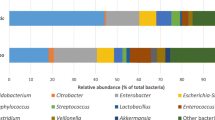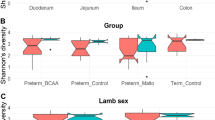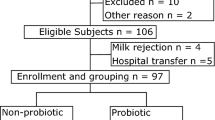Abstract
We aimed to determine the effects of enteral supplementation of a prebiotic mixture of neutral and acidic oligosaccharides (scGOS/lcFOS/pAOS) on the faecal microbiota and microenvironment in preterm infants. Furthermore, we determined the influence of perinatal factors on the development of the faecal microbiota. In a randomised controlled trial, preterm infants with gestational age <32 weeks and/or birth weight <1,500 g received enteral supplementation of scGOS/lcFOS/pAOS or placebo (maltodextrin) between days 3 and 30 of life. Faecal microbiota, as measured with fluorescent in situ hybridisation (FISH), and microenvironment [short-chain fatty acids (SCFAs), pH, sIgA] were measured at four time points: before the start of the study and at days 7, 14 and 30 of life. In total, 113 preterm infants were included. Enteral supplementation of the prebiotic mixture increased the total bacteria count at day 14 (Exp 3.92; 95 % confidence interval [CI] 1.18–13.04, p = 0.03), but not at day 30 (Exp 1.73; 95 % CI 0.60–5.03, p = 0.31). There was a trend toward increased bifidobacteria counts. There was a delayed intestinal colonisation of all bacteria. Enteral supplementation of the prebiotic mixture decreased the faecal pH (Exp 0.71; 95 % CI 0.54–0.93, p = 0.01) and there was a trend toward increased acetic acid compared to the placebo group (Exp 1.09; 95 % CI 0.99–1.20, p = 0.10). There was no effect on sIgA (Exp 1.94; 95 % CI 0.28–13.27, p = 0.50). Antibiotics decreased the total bacteria count (Exp 0.13; 95 % CI 0.08–0.22, p < 0.001). Enteral supplementation of a prebiotic mixture of neutral and acidic oligosaccharides increases the postnatal intestinal colonisation. However, the extensive use of broad-spectrum antibiotics in preterm infants decreased the growth of all intestinal microbiota, thereby, delaying the normal microbiota development.

Similar content being viewed by others
References
Neish AS (2009) Microbes in gastrointestinal health and disease. Gastroenterology 136:65–80
Westerbeek EA, van den Berg A, Lafeber HN et al (2006) The intestinal bacterial colonisation in preterm infants: a review of the literature. Clin Nutr 25:361–368
Lu L, Walker WA (2001) Pathologic and physiologic interactions of bacteria with the gastrointestinal epithelium. Am J Clin Nutr 73:1124S–1130S
Niñonuevo MR, Lebrilla CB (2009) Mass spectrometric methods for analysis of oligosaccharides in human milk. Nutr Rev 67(Suppl 2):S216–S226
Boehm G, Moro G (2008) Structural and functional aspects of prebiotics used in infant nutrition. J Nutr 138:1818S–1828S
Knol J, Boehm G, Lidestri M et al (2005) Increase of faecal bifidobacteria due to dietary oligosaccharides induces a reduction of clinically relevant pathogen germs in the faeces of formula-fed preterm infants. Acta Paediatr Suppl 94:31–33
Sherman PM, Cabana M, Gibson GR et al (2009) Potential roles and clinical utility of prebiotics in newborns, infants, and children: proceedings from a global prebiotic summit meeting, New York City, June 27–28, 2008. J Pediatr 155:S61–S70
Westerbeek EA, van den Berg JP, Lafeber HN et al (2010) Neutral and acidic oligosaccharides in preterm infants: a randomized, double-blind, placebo-controlled trial. Am J Clin Nutr 91:679–686
Scholtens PA, Alliet P, Raes M et al (2008) Fecal secretory immunoglobulin A is increased in healthy infants who receive a formula with short-chain galacto-oligosaccharides and long-chain fructo-oligosaccharides. J Nutr 138:1141–1147
Fukuda S, Toh H, Hase K et al (2011) Bifidobacteria can protect from enteropathogenic infection through production of acetate. Nature 469:543–547
Edwards CA, Parrett AM, Balmer SE et al (1994) Faecal short chain fatty acids in breast-fed and formula-fed babies. Acta Paediatr 83:459–462
Bakker-Zierikzee AM, Tol EA, Kroes H et al (2006) Faecal SIgA secretion in infants fed on pre- or probiotic infant formula. Pediatr Allergy Immunol 17:134–140
Thiel R, Blaut M (2005) An improved method for the automated enumeration of fluorescently labelled bacteria in human faeces. J Microbiol Methods 61:369–379
Bakker-Zierikzee AM, Alles MS, Knol J et al (2005) Effects of infant formula containing a mixture of galacto- and fructo-oligosaccharides or viable Bifidobacterium animalis on the intestinal microflora during the first 4 months of life. Br J Nutr 94:783–790
Schwiertz A, Gruhl B, Löbnitz M et al (2003) Development of the intestinal bacterial composition in hospitalized preterm infants in comparison with breast-fed, full-term infants. Pediatr Res 54:393–399
Butel MJ, Suau A, Campeotto F et al (2007) Conditions of bifidobacterial colonization in preterm infants: a prospective analysis. J Pediatr Gastroenterol Nutr 44:577–582
Magne F, Abély M, Boyer F et al (2006) Low species diversity and high interindividual variability in faeces of preterm infants as revealed by sequences of 16S rRNA genes and PCR-temporal temperature gradient gel electrophoresis profiles. FEMS Microbiol Ecol 57:128–138
Mshvildadze M, Neu J, Shuster J et al (2010) Intestinal microbial ecology in premature infants assessed with non-culture-based techniques. J Pediatr 156:20–25
van den Berg A, van Elburg RM, Westerbeek EA et al (2007) The effect of glutamine-enriched enteral nutrition on intestinal microflora in very low birth weight infants: a randomized controlled trial. Clin Nutr 26:430–439
Budding AE, Grasman ME, Lin F et al (2010) IS-pro: high-throughput molecular fingerprinting of the intestinal microbiota. FASEB J 24:4556–4564
Tanaka S, Kobayashi T, Songjinda P et al (2009) Influence of antibiotic exposure in the early postnatal period on the development of intestinal microbiota. FEMS Immunol Med Microbiol 56:80–87
Cotten CM, Taylor S, Stoll B et al (2009) Prolonged duration of initial empirical antibiotic treatment is associated with increased rates of necrotizing enterocolitis and death for extremely low birth weight infants. Pediatrics 123:58–66
Sobko T, Schiött J, Ehlin A et al (2010) Neonatal sepsis, antibiotic therapy and later risk of asthma and allergy. Paediatr Perinat Epidemiol 24:88–92
Biasucci G, Rubini M, Riboni S et al (2010) Mode of delivery affects the bacterial community in the newborn gut. Early Hum Dev 86(Suppl 1):13–15
Salminen S, Gibson GR, McCartney AL et al (2004) Influence of mode of delivery on gut microbiota composition in seven year old children. Gut 53:1388–1389
Fanaro S, Jelinek J, Stahl B et al (2005) Acidic oligosaccharides from pectin hydrolysate as new component for infant formulae: effect on intestinal flora, stool characteristics, and pH. J Pediatr Gastroenterol Nutr 41:186–190
Duffy LC (2000) Interactions mediating bacterial translocation in the immature intestine. J Nutr 130:432S–436S
Waligora-Dupriet AJ, Dugay A, Auzeil N et al (2009) Short-chain fatty acids and polyamines in the pathogenesis of necrotizing enterocolitis: kinetics aspects in gnotobiotic quails. Anaerobe 15:138–144
Boehm G, Jelinek J, Stahl B et al (2004) Prebiotics in infant formulas. J Clin Gastroenterol 38:S76–S79
Kuitunen M, Savilahti E (1995) Mucosal IgA, mucosal cow’s milk antibodies, serum cow’s milk antibodies and gastrointestinal permeability in infants. Pediatr Allergy Immunol 6:30–35
Acknowledgements
We are indebted to the parents for allowing their infants to participate in the study. Furthermore, we thank the medical and nursing staff of the neonatal intensive care unit of the VU University Medical Center and all the participating hospitals and Danone Research for the financial support and for providing the preterm formula (Nenatal Start®, Nenatal 1®) and study supplementation (acidic and neutral oligosaccharides and placebo [Maltodextrin]).
Financial disclosure
This study was supported by an unrestricted research grant from Danone®, Friedrichsdorf, Germany. Danone® also supported the manufacture of the prebiotic mixtures used in this study, but had no involvement in the analysis of the data or the interpretation of the results of this investigation. All authors approved the final version of the manuscript.
Conflict of interest
None of the authors have a conflict of interest.
Author information
Authors and Affiliations
Corresponding author
Rights and permissions
About this article
Cite this article
Westerbeek, E.A.M., Slump, R.A., Lafeber, H.N. et al. The effect of enteral supplementation of specific neutral and acidic oligosaccharides on the faecal microbiota and intestinal microenvironment in preterm infants. Eur J Clin Microbiol Infect Dis 32, 269–276 (2013). https://doi.org/10.1007/s10096-012-1739-y
Received:
Accepted:
Published:
Issue Date:
DOI: https://doi.org/10.1007/s10096-012-1739-y




